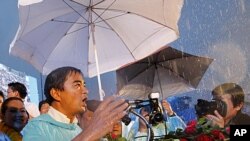Thai authorities are deploying tens of thousands of police at voting booths across the country to prevent violence and intimidation during Sunday’s national election, the first since 2007.
Tight race
The race is expected to be tightly contested and comes at a time of intense polarization following last year’s deadly political clashes, and observers are expressing concern about Thailand’s stability following the vote.
Video of election campaigns
Security will be tight with over 100,000 police posted at polling booths to ensure smooth voting.
Damaso Magbual is chairman of the Asia Network for Free Elections, a group monitoring the polling. He has observed the last few Thai elections and says this one is the most polarized he has ever seen.
“The incidents of violence have exceeded the previous elections," says Magbual. "But, if it is any comfort to the Thai people, it’s not as bad as the Philippines or Sri Lanka, you might put it that way. But this can escalate as the election draws closer and sometimes even after the elections.”
The main parties contesting the vote are the ruling Democrats of Prime Minister Abhisit Vejjajiva, and the opposition Pheu Thai party of Yingluck Shinawatra, younger sister of former Prime Minister Thaksin Shinawatra.
Yingluck Shinawatra, sister of ousted premier Thaksin Shinawatra, is surrounded by reporters as she takes a stage for the last big pre-election rally for her Puea Thai party at a stadium in Bangkok. (Reuters)
Despite being twice popularly elected, Thaksin was ousted by the military in 2006 over concerns he was growing too powerful.
Sporadic protests
Since then, Thailand has struggled through sporadic protests and violence in a power struggle between his mainly working class supporters and a traditional elite backed by the military.
Subsequent governments and parties loyal to Thaksin were dissolved by controversial court orders and their politicians banned from office for five years.
Magbual says the dissolution of parties for the actions of their members is against the basic principles of free and fair elections.
“The party has a distinct personality from the officers of the party. If the officers of the party commit wrong doing, by all means they have to answer for the law. But, the acts of the, for certain members of the party should not affect the entire party as a whole. Again, that is pretty quite unique to Thailand,” he says.
Abhisit says Sunday’s vote could help restore stability to the country’s turbulent politics, but only if voters re-elect his ruling Democrat party. He says as prime minister he has represented all of Thailand and rejects critics who say he is supported by the army and privileged classes.
“This is an attempt to try to discredit the party, discredit the political process," he says. "We’re now heading for free and fair elections. I was the one who decided to dissolve the house early so that the people can have their say and I’m sure everyone will respect the results.”
Despite the prime minister's assurances, political analysts say if Pheu Thai wins, and forms the next government, forces supporting his Democrats would not accept the results so easily.
Thaksin's legacy
Thaksin, despite fleeing into exile to avoid a 2008 jail sentence for corruption, is de facto leader of Pheu Thai. And Pheu Thai is leading in opinion polls.
Thaksin is fiercely opposed by Bangkok elites who say he was authoritarian, corrupt, and disloyal to the revered monarchy. He denies all the charges.
|
Thailand's 26th Election
|
Yingluck’s critics say she is just a stand-in for her brother and a way for him to return to power.
She acknowledges her party may seek an amnesty for Mr. Thaksin, along with other politicians, but says he would not play a decision-making role if she forms a government.
“I think he has been very successful in terms of launching the campaigns and in terms of helping the country to bring the wealth," she says. "So, we can use his idea. But, finally, just the information of the idea. But, we have the ours, Pheu Thai strategy and management to talk about that and we make decision on our own which campaign that has good for Thai people,” Yingluck says.
Thai soldiers last year fought street battles in Bangkok with armed elements among Thaksin’s red shirt supporters, leaving 90 people dead, most of them civilians.
The Red Shirt protesters were demanding new elections, saying their vote had been stolen by the military in the 2006 coup and a politicized justice system.
The government said it was an attempt by Thaksin to force his way back into power.
High stakes election
Thitinan Pongsudhirak, a director of the Institute of Security and International Studies at Chulalongkorn University, says the stakes in this election cannot be understated.
“The stakes in this election is the future of Thailand. The power structure, the superstructure, who will be calling the shots. The future of the voices that have been expressed in elections, the democratic process, the future of Thai democracy is at stake,” he says.
Analysts say it is quite possible that neither Pheu Thai nor the Democrats win an outright majority. In that case, the party with the most votes would get the first chance to try to form a coalition government with smaller parties.
That would allow for a period of deal-making and uncertainty that observers worry could give the Thai military an excuse to take power.
Thailand has a history of military interference in politics with 18 coups or attempted coups since 1932.
Nonetheless, the army chief on Thursday once again denied a coup was possible.




